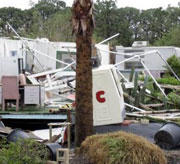|
 |
| A house trailer sits destroyed after Hurricane
Frances passed through West Boynton Beach, Florida, September 5,
2004.(Reuters) |
Hurricane Frances is set to cause billions of dollars in insured losses
in the US, experts predict.
The storm has hit the Florida coast, uprooting trees and cutting power
to hundreds of thousands of homes.
Florida Power and Light said 459,000 customers had been cut off,
despite the storm weakening.
As it batters the "Sunshine State", Frances could cause between $2bn
and $10bn in insured damages, industry group Risk Management Solutions
said.
In the UK, further flights to the area have been cancelled, while
earlier axed flights meant that some 6,000 Britons on package holidays,
and many more flight-only travellers, have been unable to return home.
The thousands that had been due to fly this weekend have been told they
can apply for refunds or book alternative flights.
Hurricane Frances has weakened to a category two storm from a category
four, but still remains dangerous.
Before the storms hit the US, about 2.8 million people had been moved
to safety inland, while 70,000 residents and tourists took refuge in
shelters.
Some areas in Frances' path have yet to recover from Hurricane Charley,
a more powerful but much smaller hurricane that caused more than $7bn
(£3.8bn) in insured losses and killed more than 20 people last month after
coming ashore on Florida's south-west coast.
Fears that the latest storm would damage Florida's citrus industry saw
orange juice prices hit nine-month highs on the commodity markets, while
fears that Alabama plantations could be hit also pushed cotton prices
higher.
Elsewhere, the domestic airline industry is set to suffer as Americans
cut short their travel plans for the long holiday weekend.
Michael Boyd, an aviation consultant at the Boyd Group, said he
expected airlines to lose out to the tune of $35m to $40m.
Ahead of Charley, the Wal-Mart chain closed around 75 stores in
preparation, and later blamed the event for a decline in August sales.
For retailers and airlines, the timing of the storm could not be worse,
coming as it does on Labor Day weekend. The public holiday on Monday makes
up one of the four long weekends that usually mean big sales for stores.
However, not all retailers look set to lose out, as shops selling food
and home improvement tools could benefit in the aftermath.
DIY chain Home Depot said it had already seen strong demand, as Florida
residents prepared for Hurricane Frances to hit by rushing to buy plywood
to board up their houses.
Food retailers also reported a surge in sales as Florida residents
stocked up on bottled water, tinned food and other essentials.
The worst such natural disaster in the region, Hurricane Andrew, caused
damage estimated at $20bn when it struck in 1992, contributing to
devastating losses on the Lloyd's of London insurance market.
But analysts say insurers have since limited their exposure to
hurricane damage, with the Florida government taking on a bigger role in
disaster insurance.
(Agencies) | 